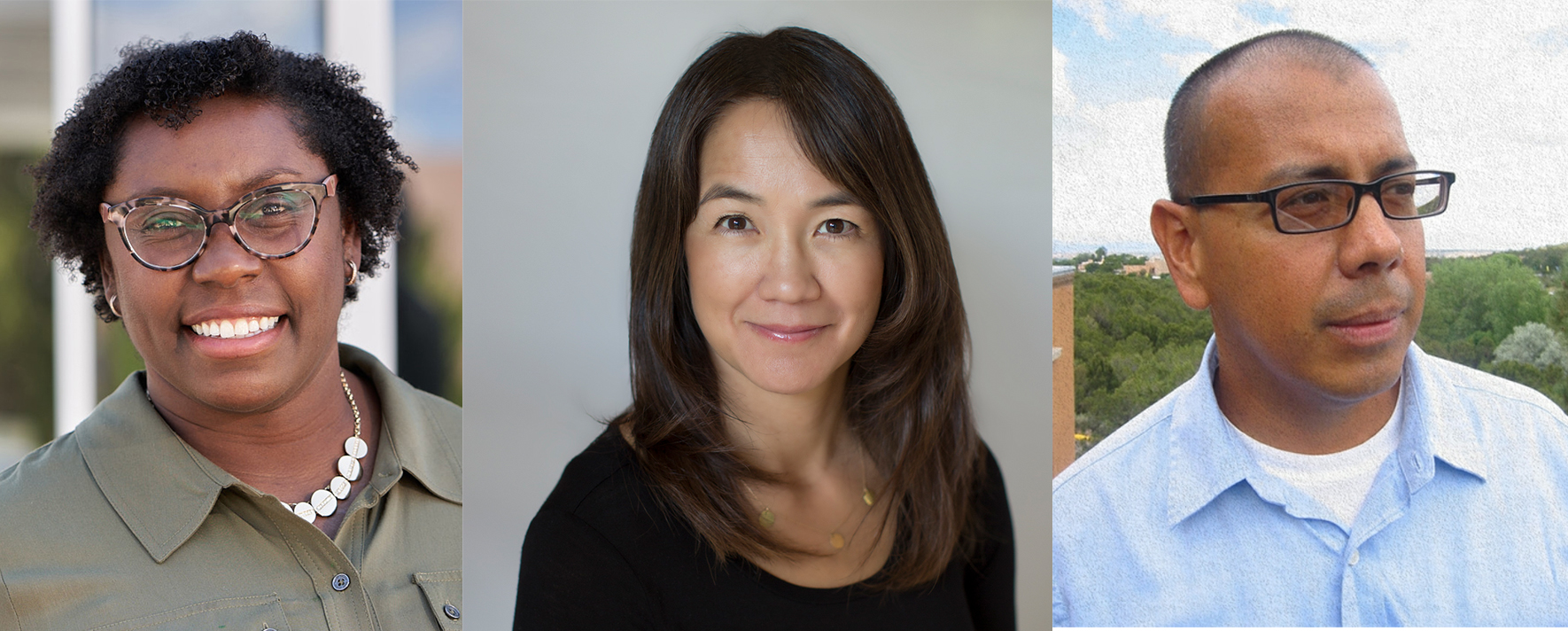Recent News
New director will enhance interdisciplinary engineering learning opportunities
July 2, 2025
Final SIRI cohort visits UNM campus
June 30, 2025
Perfetti receives ANS Landis Engineering Achievement Award
June 26, 2025
Engineering a new treatment for ovarian cancer
June 24, 2025
News Archives
Be the change: UNM leads National Science Foundation collaborative project to increase diversity among STEM faculty
April 11, 2022 - by Kim Delker
Ensuring our campuses are as diverse as the population at large has long been a goal of university leaders, especially in the STEM fields, which have historically lagged other disciplines. But while the goal is widely accepted, the pathway to success has been less clear.

Liz Godwin, Mala Htun, Jesse Alemán
Realizing that many top-down guidelines to improve diversity among faculty do not motivate stakeholders to change their behavior, a new research effort led by The University of New Mexico is taking a different approach based on Frank Dobbin and Alexandra Kalev’s managerial engagement theory: seeking the ideas and feedback from faculty first to guide strategic decisions on to broaden participation.
“AGEP to Engage Leaders to Improve Diversity among STEM Faculty” is a two-year, $195,000 project led by principal investigator Mala Htun, a professor of political science, along with Liz Godwin, a research associate professor in the Department of Electrical and Computer Engineering and a 2021-22 UNM Inclusive Excellence Postdoctoral and Visiting Scholar; and Jesse Alemán, a professor in the Department of English Language and Literature and the associate dean of Graduate Studies and special assistant for equity and excellence in graduate education in the College of Arts and Sciences.
The UNM team is collaborating with Arizona State University and University of Oregon on the project. The three institutions share several distinctions: they are Carnegie classification of Doctoral Universities: Very High Research Activity (R1) universities located in Western states; they have a commitment to advancing the success of people who are historically underrepresented in the science, technology, engineering and math fields; and two of the three partners have an NSF ADVANCE (Advancement of Women in Academic Science and Engineering Careers) program in place at their institutions.
The ultimate goal of this NSF Alliances for Graduate Education and the Professoriate (AGEP) Catalyst Alliance project is to position the three universities to apply for an Institutional Transformation Alliance ($4.4 million) award as early as next year. These efforts are important because improving equity and inclusion is critical to advancing STEM faculty, educating America’s future STEM workforce, and fostering individual opportunity, all of which is crucial for a thriving U.S. economy.
“We aim to develop a set of strategies and guidelines that can help attract and retain faculty from underrepresented groups in the science and technical fields. Ultimately, we strive for institutional transformation with changes that will impact not just faculty but also graduate students and postdoctoral researchers,” Godwin said.
The catalyst stage of the research will focus on four main activities: diagnosing challenges to broadening Ph.D. student and faculty participation through a quality-of-life survey at each partner institution; creating a pilot program for managerial engagement to build a sense of buy-in and ownership from the leaders; developing a five-year equity plan at each partner institution; and developing and refining an effective working alliance between the three universities.
“The changes we hope to implement will have a long-standing institutional impact on the quality of life and the quality of educational experience that our graduate students, especially the underrepresented ones, will receive in our STEM programs,” Alemán said. “What we’ve learned over the last few years is that even seemingly minor changes can have a profound impact on creating structural and institutional access for graduate students, and faculty are key for making those changes.”
Godwin said what sets this project apart is that they will be seeking the ideas and input initially from a large and varied group of deans and department chairs in all the STEM disciplines to listen to their ideas and concerns. At UNM, this will be held on April 15 on Zoom and will include deans and department leads from the STEM areas of the College of Arts and Sciences as well as the School of Engineering and the School of Architecture and Planning at UNM.
After the initial group meeting, Godwin said the research team will start identifying themes that come out of the meeting and creating a quality-of-life survey to distribute among faculty, graduate students and postdocs that will provide the group with data. The partner institutions will hold similar meetings, and the team will work together to craft the climate surveys to launch by fall 2022.
Htun worked in 2020 with Christos Christodoulou, Jim and Ellen King Dean of Engineering and Computing, to conduct a similar School-wide survey that identified points of success and areas for improvement. She is also a co-principal investigator and deputy director of the NSF-funded ADVANCE at UNM project, as well as special advisor for inclusion and climate for the School of Engineering. Alemán has launched a variety of initiatives in Graduate Studies for minority student success and is UNM’s lead investigator on a proposed NSF Alliance grant specifically targeting Latinx graduate student access to STEM at R1 Hispanic-Serving Institutions nationally.
“We are grateful to NSF for their confidence in UNM’s leadership and our success developing evidence-based approaches to broaden participation in STEM,” Htun said. “This AGEP Catalyst award will help us showcase the innovative research we are doing on campus to a broad national audience.”
